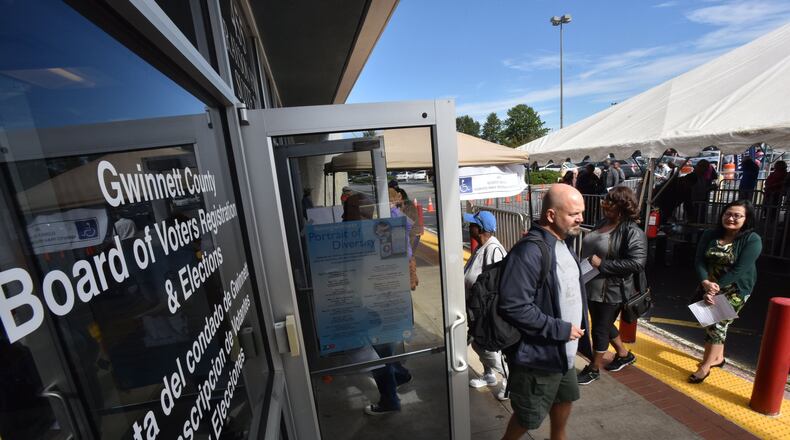An overly stringent review of absentee ballots in Gwinnett County and the state of Georgia has the potential to disenfranchise thousands of people, attorneys for multiple voting and civil rights groups argued in federal court Tuesday.
A judge will decide soon if she agrees.
U.S. District Court Judge Leigh Martin May heard arguments Tuesday afternoon in two different lawsuits filed last week against Secretary of State Brian Kemp and the Gwinnett County Board of Registrations and Elections. Both suits — one led by the American Civil Liberties Union, the other by the Lawyers’ Committee for Civil Rights Under Law and the Coalition for Good Governance — asked for immediate protections for absentee voters in the Nov. 6 election.
Kemp has remained in place as secretary of state while also running for governor. That has drawn the ire of some Democrats and other advocates, who have raised questions about his ability to impartially supervise an election that he’s involved in. He faces Stacey Abrams, who would be the first African-American woman in the nation elected to a gubernatorial seat.
The ACLU-led suit seeks a temporary restraining order prohibiting elections officials from rejecting absentee ballots and absentee ballot applications due to signatures not matching other government documents unless would-be voters are given “pre-rejection notice” and an opportunity to resolve the issue.
The Lawyers’ Committee suit argues that “signature committees” should be created to review possible mismatches and that procedures for notifying residents about rejected ballots should be improved.
“The risk increases every day that an absentee voter will not receive a rejection letter until it’s too late,” ACLU legal director Sean Young argued Tuesday.
But Gwinnett County officials say new requirements introduced before next month’s election would be a burden.
“Requiring another review or further new procedures at this point in the process will require taking workers who are stretched to the limit with required election-related tasks to repeat their review of absentee ballot applications and absentee ballots,” the county argued in its written response.
May asked many questions during the hearing but did not rule from the bench. The judge said she would issue an order in the coming days.
She raised questions about whether there is “adequate procedural due process” for residents whose absentee ballots are rejected because of their signatures.
May asked attorneys multiple times for their thoughts on allowing hearings for those potential absentee voters. Such mechanisms already exist for voters whose ballots are rejected due to other eligibility questions.
“The system is already in place,” May said.
Gwinnett County was targeted alongside Kemp in both suits because, as an analysis by The Atlanta Journal-Constitution found, it has rejected a disproportionate number of absentee ballots and applications. Only about one-sixth of Gwinnett's rejections, though, were due to signature issues, according to recent legal filing.
In a response to the ACLU-led suit filed Monday, attorneys for Gwinnett said that, through Oct. 18, the county had rejected 713 absentee ballot applications and another 524 absentee ballots. Those stats did not include another 253 absentee ballots canceled because the voter ultimately chose to vote in person, the county’s filing said.
Of the more than 1,200 ballots or ballot applications rejected, less than 200 were due to alleged signature mismatches, Gwinnett officials said.
The vast majority of the other rejections were attributed to missing information, they said.
Overall, the county has processed nearly 23,000 absentee ballot applications and 7,000 absentee ballots. Officials have repeatedly said the county is merely following state law.
“Inserting any hiccup into the system … has the potential to radically effect the way counties are able to discharge their duties,” attorney Russ Willard said.
He called the plaintiffs’ motions “back-of-the-napkin, scribbling relief requests.”
Both filings homed in on Georgia's controversial "exact match" law, which requires voter registration information to match driver's licenses, state ID cards or Social Security records. Tens of thousands of potential voters across the state are in limbo due to law, according to yet another federal lawsuit that's attempting to overturn exact match.
But those voters, whose registrations are in pending status, can still cast ballots in November’s elections if they present valid ID.
About the Author
Keep Reading
The Latest
Featured



